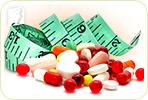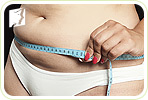Although popular culture claims that more alcohol equals more fat, it seems that the truth is less straightforward. Many scientific studies have been conducted to verify if there is a relationship between alcohol consumption and weight gain, and their results seem to suggest the link is weaker than one might think.
Quick Fact
The amount of days drinking and the number of drinks per occasion has been shown to have no more than a small effect on body mass index (BMI). For that reason, it is unlikely to have a huge impact on weight fluctuations.
It has been suggested that lack of weight gain in people who drink more is often counteracted by better living in other ways, such as regular exercise and a healthy diet. Read on to know the physical effects that alcohol can have on the body.
Increases Appetite
Alcohol gets rid of inhibitions, which may lead to excessive eating, because it impairs the individual's judgment when it comes to portion sizes and food quality. This is aggravated by the fact that most snacks commonly found in bar settings or associated with festive drinking tend to be fat-laden and starchy.
Calorie-Dense
Alcohol is typically nutrient-poor but calorie-rich. A 12-ounce can of regular beer contains approximately 145 calories, and a 5-ounce glass of wine contains approximately 135. As alcohol doesn't suppress appetite, these calories will typically be consumed on top of a normal diet, leading many drinkers to consume more than the recommended amount of calories per day.
Related to Sedentary Habits
Drinking is typically done alongside stationary and passive activities, such as watching television, eating a meal, or sitting at the bar for long periods of time. The lack of movement while ingesting calorific beverages can lead to weight gain, but should not be a problem if care is taken to counteract moments of drinking with a physical exercise routine.
Inhibits Ability to Burn Fat
The liver converts alcohol to acetate, which is then used as an energy source by the body. If there are high levels of acetate in the bloodstream, then this will be burned instead of the fat stores. This means that more exercise must be done than would normally be required in order to compensate, even if fat intake stays the same.
The truth seems to be that, although alcohol does have physiological effects on the body that could potentially lead to weight gain, these can be easily counteracted by a reasonably healthy lifestyle. Drunkenness can typically lead to consumption of highly-processed fast food, but as long as this is not a consistent activity, weight gain will not usually occur. As with most things, alcohol in moderation and a generally balanced lifestyle are the key.
Sources
- French, M.T. et al. (2010). Alcohol Consumption and Body Weight. Health economics, 19(7), 814-832. doi: 10.1002/hec.1521
- U.S. Department of Health and Human Services. (n.d). Choose Sensibly. Retrieved July 21, 2014, fromhttp://www.health.gov/dietaryguidelines/dga2000/document/choose.htm




